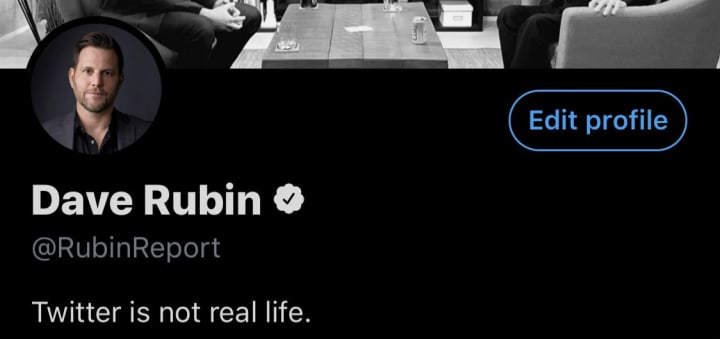'Twitter is not real life'
The world now faces two invisible enemies, and they are working alongside one another

Opinions on social media, I've always said, are exaggerations of reality. But the nature of social media only furthers this exaggeration, and, Twitter especially, becomes a hotbed of extreme views and intolerances. Libertarian commentator and comedian Dave Rubin used to have the title of this article as his Twitter bio, in an effort to combat the worry and panic one might experience at the thought of the world truly going down the pan as a result of thinking that social media does in fact reflect reality. Even he, however, is guilty of falling victim to this mentality, I would say. That's just the nature of the beast.

What concerns me, though, is that the actual media seems to subscribe to this idea that Twitter is real life, and newspapers and television news outlets will frequently take a "side" and then go on to reflect the same form of extremity that the internet produces. And when the media, who have a lot of influence, start acting like that, politics follows suit. And what is upsetting to me is that we then get the idea that these extremities are a reflection of the whole of society, when in fact this is quite utterly untrue. Yes, you will find extremities, and yes, you will encounter the worst parts of society, but I would vouch that the majority of people do not subscribe to this outlook on life. Politically and socially, most of us are fairly neutral and fairly easy-going.
But the fact that the media and politicians do not reflect the world and instead reflect the online world was starting to deeply concern me, because it is in these organisations that the power in society lies, and I have written articles in the past expressing my concern in various ways.
And then the COVID-19 pandemic happened.
Now, I've said before that, when coronavirus broke out, I thought all this online awfulness and its seepage into mainstream society would massively decline. Because I saw solidarity everywhere, and politicians, the media and the people all seemed to be on the same page in order to defeat this invisible enemy. But this didn't last long. After a period of lockdown, fuelled I think by the lockdown itself and also of course by the tragic death of George Floyd, the internet became the hotbed it once was, and so did the media and politics, whether they were reporting on COVID or social justice.

But I have never really put two and two together before until recently. To me, the coronavirus couldn't be political because it's a health issue. And yes, like I say, the mental health effects of lockdown may have influenced and fuelled the issues with social media that I already had, but the virus itself wasn't part of the issue. Now, however, I see a very strong link. And it scares me where this link is taking us as a society. Now, I, like many people, took the virus and lockdown very seriously when it all started. But as time goes on and facts come to light, I have become more and more cynical. And I have seen patterns that I never noticed before. Now, I, for one, am very much of the mind that this virus is very real and very contagious and, for the vulnerable, very nasty and very dangerous. And from the onset I thought the country that approached it best was New Zealand, by calling for a complete lockdown immediately. Such an action, in my view, saved lives without crippling the economy, because such a swift response meant the virus could not spread throughout the country. Britain, where I live, like just about every other country, did not impose a lockdown until it was too late. Now, during the lockdown I was aware of this fault, but I was still of the mind that a lockdown was still the right choice. However, I now live in a country with mountains of debt, a crippled economy, constant restrictions on freedom still in place, unemployment and homelessness on the rise, people with serious illnesses not being seen in hospital, exam results a fiasco, education in shambles, a disastrous track and trace system, copious care home deaths, and no sign of a vaccine in the near future. This is all, as well, thanks to a government that now rules without democracy. All this is now happening alongside the cultural and political changes that worried me prior to the pandemic.

And what is the pattern? The fact that the opinion of the media and the decisions made by the government reflect, in my view, a very small percentage of those in society, who are rightly concerned about everything I've listed above. They instead reflect the extremities that the online world shows. Publicly disagreeing with the idea that the restrictions are necessary and the virus can't be allowed to take over our lives is an unpopular opinion. And its nature as something that can kill makes it a gift for those who spread fear and shame online. And, as the cultural wars before them did, this fuels the extreme right. I think it goes without saying that most people who disagree with the rules still follow them on the whole, but we now have the ludicrous opposite end of the spectrum on the rise, with anti-maskers, people who spit on others who engage in social distancing, and countless other extremists about. This is a small part of society, but I would wager that it is not much smaller than those who totally agree with the government and the media. And again, all around me, our livelihoods are being lost, education is a mess, businesses are on the precipice, rules are in place that just defy human nature, and I sit and listen to the media and the politicians act as if we're all on the same page, and that anyone who defies this (latest target is young people and the hospitality industry) is an extremist and has blood on their hands. In reality, I think the opinion is universal that the vulnerable should be protected and the government and the taxpayer should step in to do so. People just don't think that freedom, education and the economy are a necessary sacrifice atop that. Meanwhile, in the USA, politicians have banned protesting to stop the spread of the virus, unless they're anti-racist protests because that is okay... See my point about the power of this interpretation of life? Twitter is not real life!!! The fact that the world already was the way it was, was bad enough, but I had hope because I know that really, there's only so much that the media and the politicians can do to control our lives. But now this virus has arrived and it has become an invisible tool to implement this vein of society onto us. The worst thing, too, is that it really is invisible. In that there is no one person behind it all, much like the internet that fuels our reaction to it. Yet it exerts so much control. I can only hope, for the sake of the world, that we can defeat it soon.
About the Creator
Matty Long
Jack of all trades, master of watching movies. Also particularly fond of tea, pizza, country music, watching football, and travelling.
X: @eardstapa_






Comments
There are no comments for this story
Be the first to respond and start the conversation.